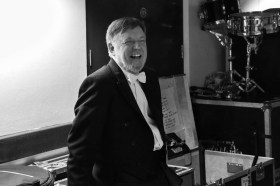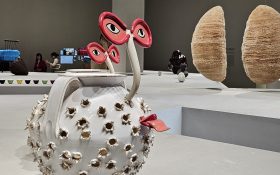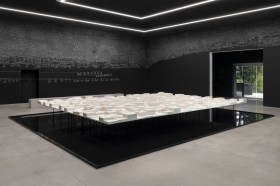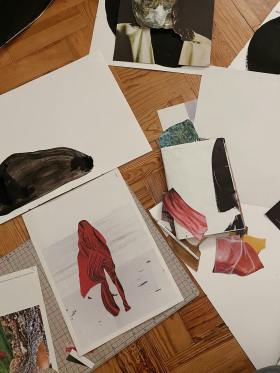There are a few famous trilogies that aren’t really. The five book Hitchhiker’s Guide, the six film Star Wars trilogy and now Shakespeare’s histories at the Roundhouse in Camden.
Shakespeare’s history plays form two cycles. Confusingly the early cycle consists of four plays about Kings Henry VI and Richard III while the latter four deal with Richard II, Henry IV and Henry V. The RSC is currently staging all eight plays with one ensemble cast in a schedule that includes marathon ‘trilogy days‘ of Henry plays. It sounds a lot more complicated than it is.
The Histories are being billed as a once in a lifetime event and no expense has been spared: a replica of the Courtyard Theatre in Stratford (where the project was first staged) has been constructed from scratch to sit inside the Roundhouse like the yolk of a perfectly fried egg.
The auditorium alone is an astonishing achievement: characters appear from under the stage, through the audience and down from the ceiling. The set is dominated by metal double doors that could clang a bit less and the smoke machine is overused but the whole carries a pleasing faint echo of the ‘Wooden O’ of Shakespeare’s own theatre 400 years ago.
The Henry IV Parts 1 & 2 and Henry V trilogy is about King Henry IV’s struggle to hold onto the crown while his son journeys from drinking with Falstaff when Prince of Wales to the famous victory over the French at the battle of Agincourt as Henry V. “Busy giddy minds with foreign quarrels” is IV’s deathbed advice to V – George? Tony? Gordon?
Michael Boyd’s extraordinary production of Henry IV Part 1 makes explicit the homoerotic subtext in a play in which so much time is taken up with competing versions of masculinity. The King and courtiers are as leathery as Hells Angels and the Prince and Poins’ eyeshadow and earrings wouldn’t look amiss on a pirate ship. The plot proceeds at a blistering pace without a single syllable of verse being lost. Lex Shrapnel puts so much fire into Hotspur that it’s all he can do to still his breathing once he’s been killed. David Warner’s Falstaff is not the funniest I’ve seen but he captures the character’s complete amorality: the cynical wounding of Hotspur’s fallen corpse at Shrewsbury is the horrific moment at which honour and its antithesis collide in the awful futility of war. Geoffrey Streatfeild sets himself a very high standard for the day as an emotional and manic Prince Hal on cocaine.
In a three course meal the main is often eclipsed by the starter: diners are hungrier when they first sit down . Henry IV Part 2 is a play in which not a lot happens: the King’s party mop up the rebels left alive after the Battle of Shrewsbury, the King dies and the Prince becomes King. It is in many ways a hangover from Part 1 and hangovers always last too long. Richard Twyman directs and does extremely well to stave off the post prandial snooze which the lack of action might tempt trilogy goers to indulge in. Clive Wood continues his excellent portrayal of the declining King racked by guilt over how he came by his crown and consumed with fear that his wayward son will forfeit it. The two-handed scenes between King and Prince are electric: they are at once father and son and cogs in a ruthless political machine. Geoffrey Freshwater wrings every last drop of humour out of Justice Shallow and Nicholas Asbury emerges unscathed from the verbal nightmare that is the role of Pistol.
Henry V is in a different tone altogether: Michael Boyd is brisk and businesslike in his direction and the bloody spectre of hand to hand medieval war is always visible behind the chest beating nationalism. Falstaff’s absence is keenly felt in the comic plot although light relief is provided by the French court suspended from trapezes: John Mackay’s tongue is just far enough out of his cheek to avoid unfavourable comparisons between his Dauphin and Blackadder. The indefatigable Geoffrey Streatfeild deservedly savours the King’s famous battle speeches. The Battle of Agincourt is spectacularly staged in every inch of the, by then, very familiar Roundhouse auditorium and the effect is only slightly spoiled by the building of a dais of coffins on which to hold the peace treaty negotiations: the construction takes a bit too long and is like watching a giant game of Jenga.
The trilogy will not be everyone’s cup of tea, but it is a fascinating test of endurance which adds new strands of subtlety to both the story and the theatrical experience. Henry IV’s death, Falstaff’s banishment and Bardolph’s disgrace mean more when you’ve come so far with them.
Watching a victorious Henry V woo a Princess played by the same actress who Prince Hal ran wild with as Eastcheap whore Doll Tearsheet is just one example of the quality of the ensemble cast and sheer breadth of the RSC’s ambition in this project. There was even a vague but palpable antipathy between trilogy old timers and the Johnny-come-lately evening punters in the crowd for Henry V.
If The Histories is a once in a lifetime opportunity for the audience then we should all be in awe of Geoffrey Streatfeild – he has three more trilogies to go; and if he can do it why not you?
Find out more about the RSC’s productions and dates at rsc.org.uk.




